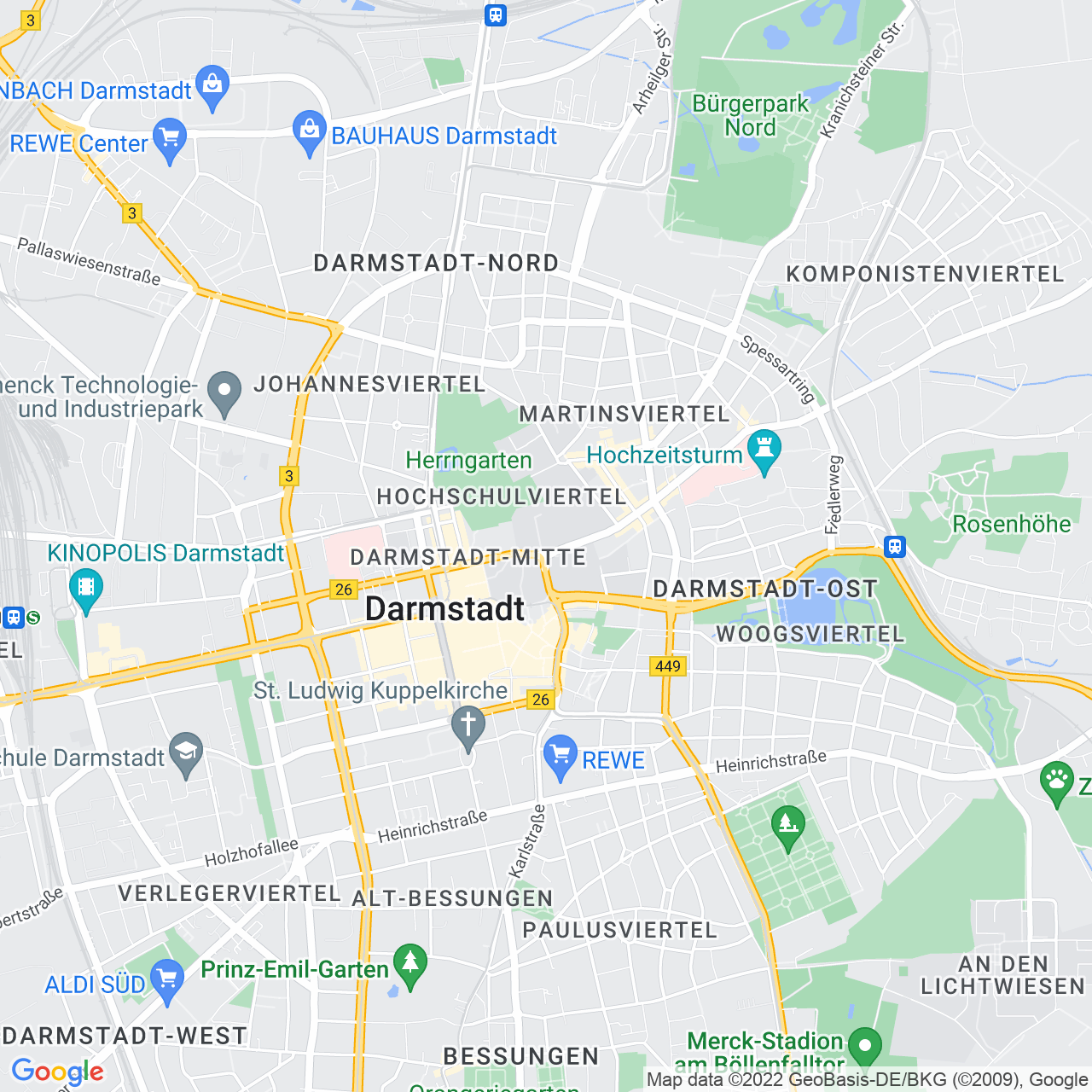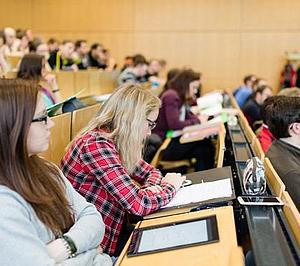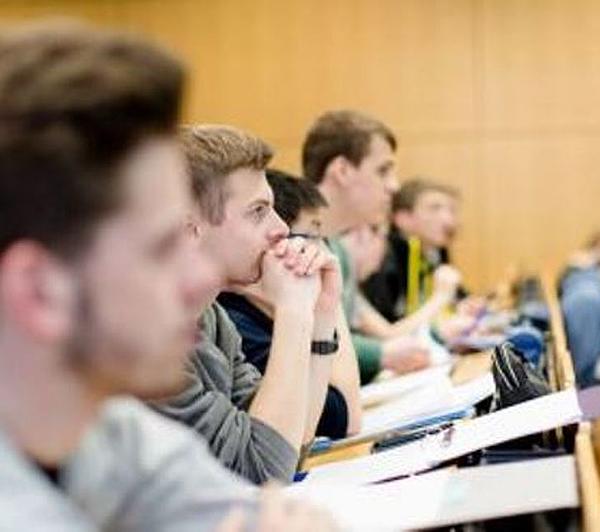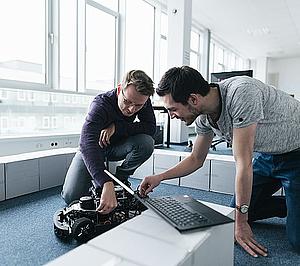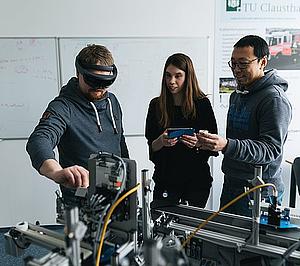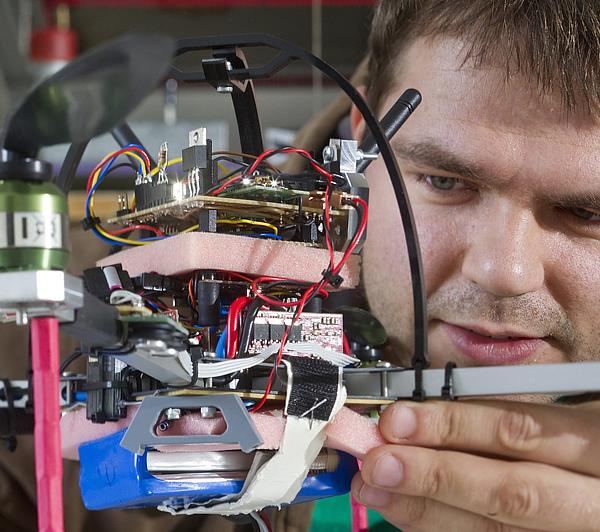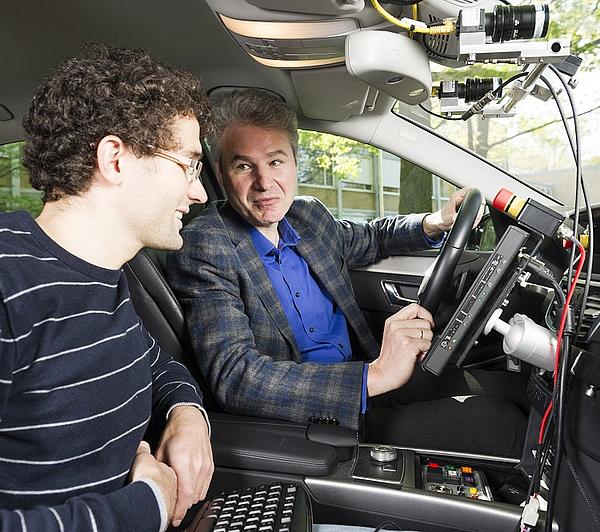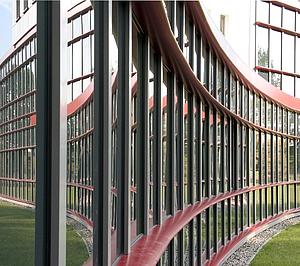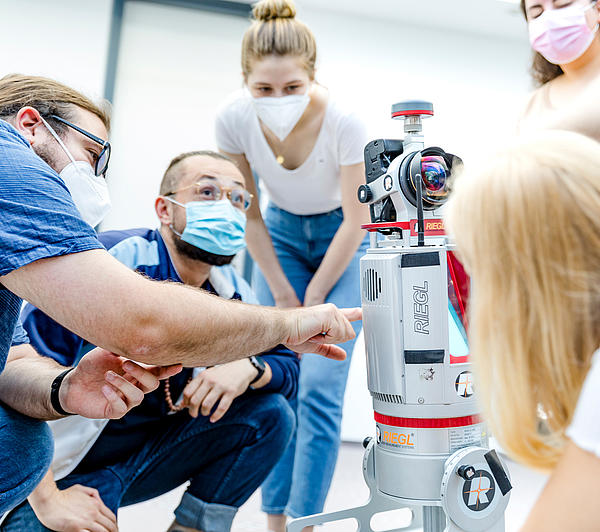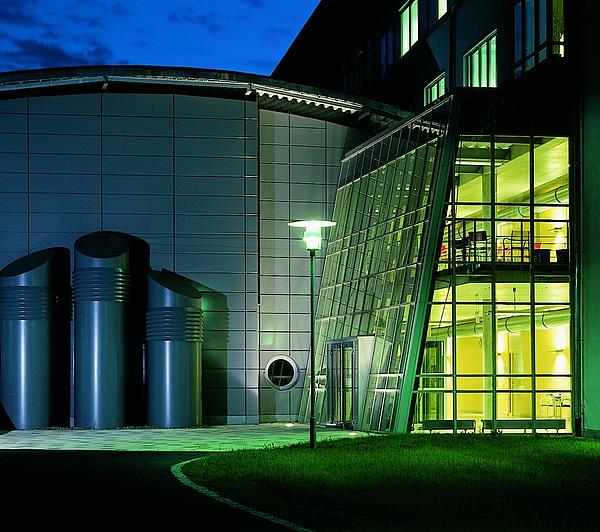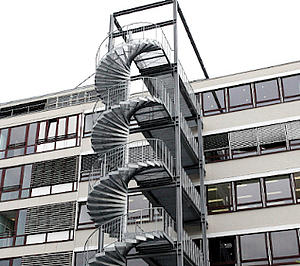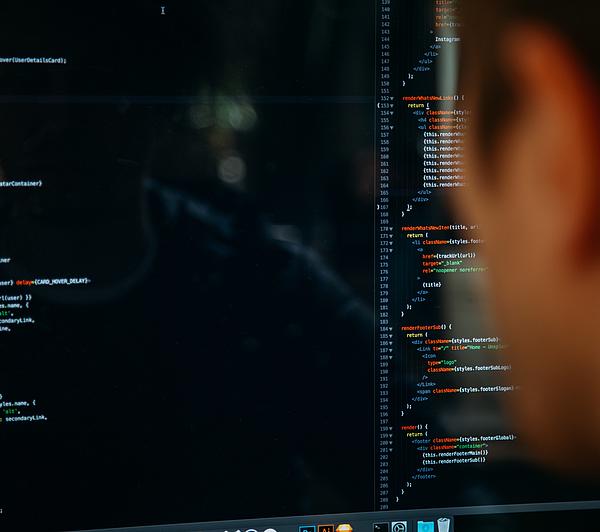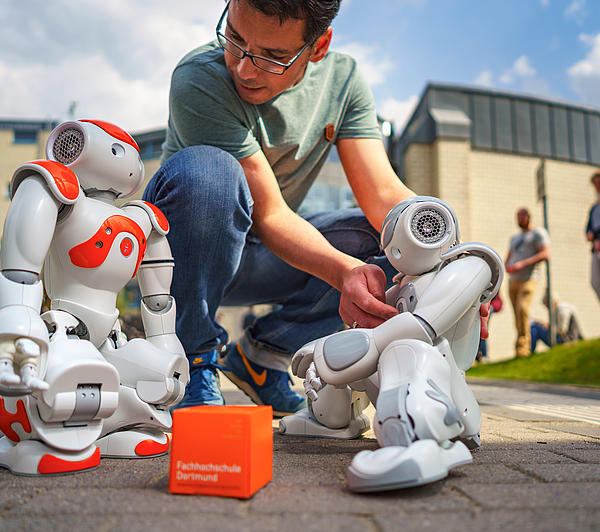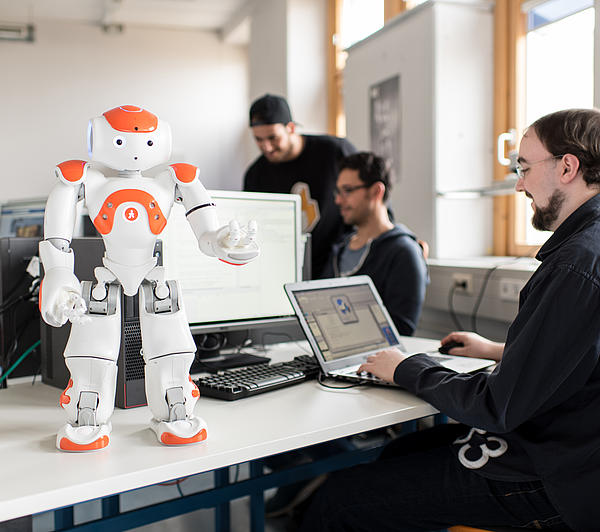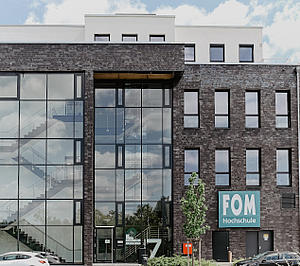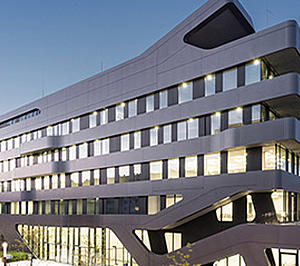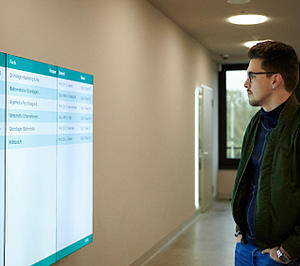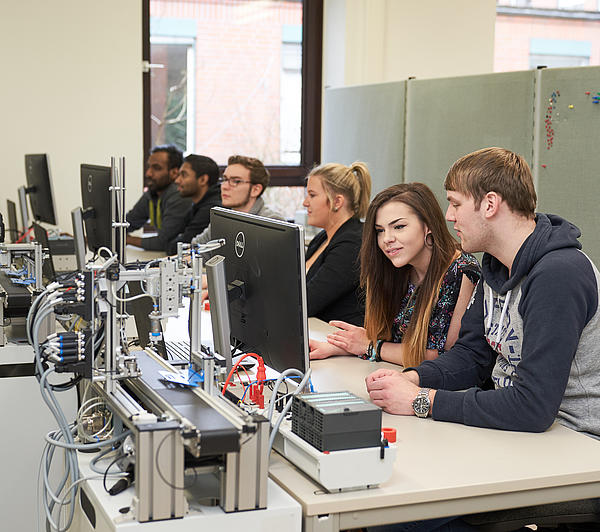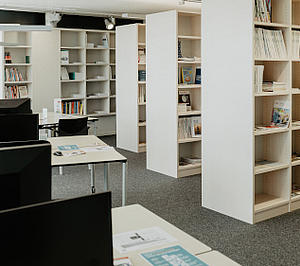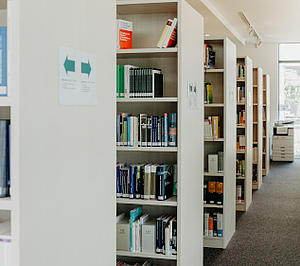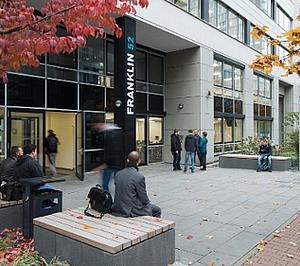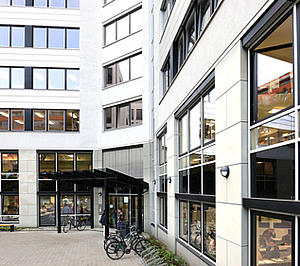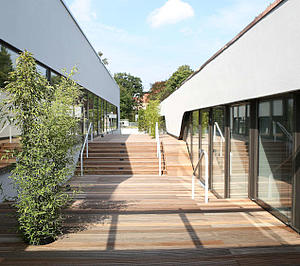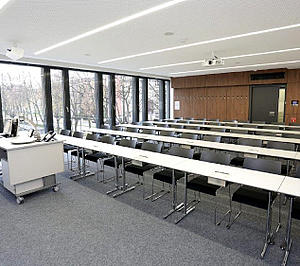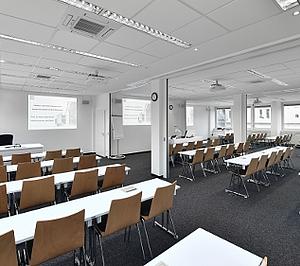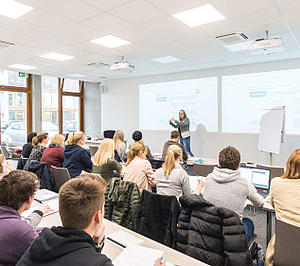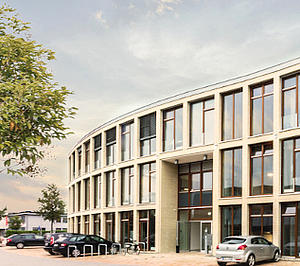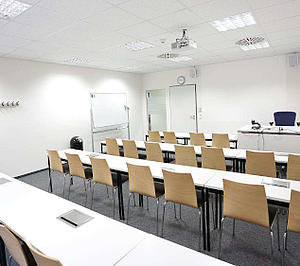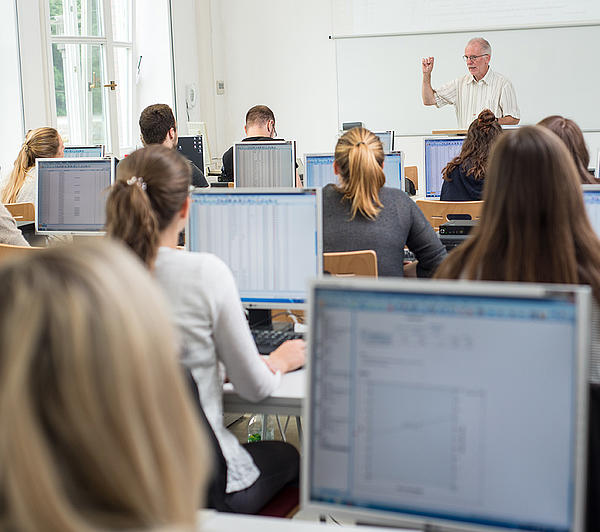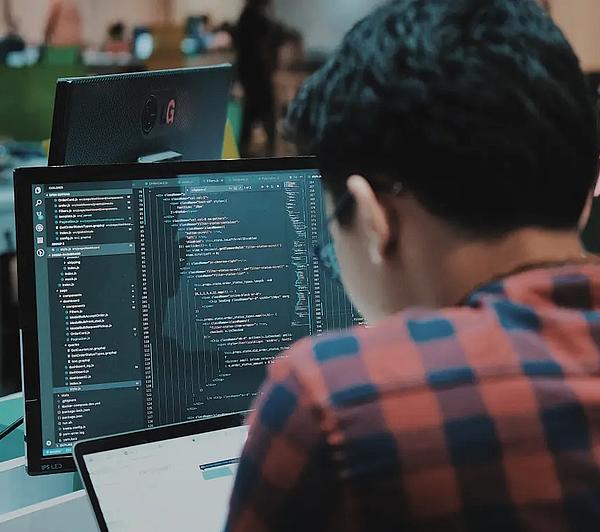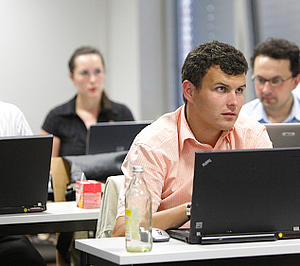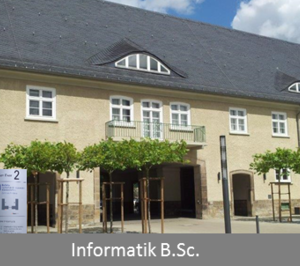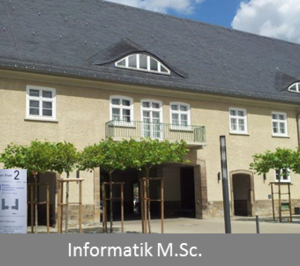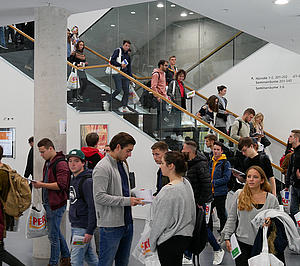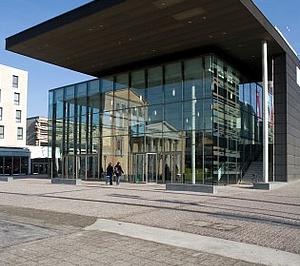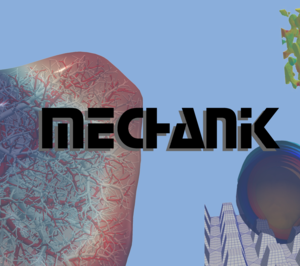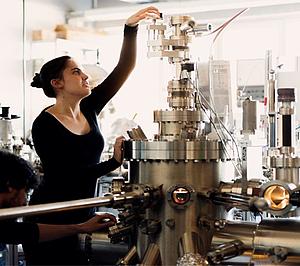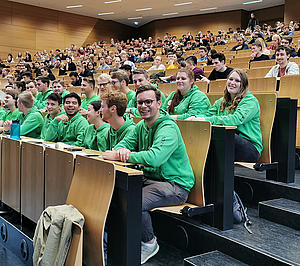Bachelor of Science, Stand 10/14 (ID 15457)
1. Semester
- Automaten, formale Sprachen und Entscheidbarkeit (5 CP)
- Digitaltechnik (5 CP)
- Funktionale und objektorientierte Programmierkonzepte (10 CP)
- Mathematik I (für Informatik und Wirtschaftsinformatik) (9 CP)
2. Semester
- Algorithmen und Datenstrukturen (10 CP)
- Aussagen und Prädikatenlogik (5 CP)
- Mathematik II (für Informatik und Wirtschaftsinformatik) (9 CP)
- Rechnerorganisation (5 CP)
3. Semester
- Architekturen und Entwurf von Rechnersystemen (5 CP)
- Computer-systemsicherheit (5 CP)
- Einführung in den Compilerbau (5 CP)
- Modellierung, Spezifikation und Semantik (5 CP)
- Software Engineering (5 CP)
- Systemnahe und parallele Programmierung (5 CP)
4. Semester
- Computational Engineering und Robotik (5 CP)
- Computer-Netzwerke und verteilte Systeme (5 CP)
- Formale Methoden im Softwareentwurf (5 CP)
- Informationsmanagement (5 CP)
- Mathematik III für Informatiker (8 CP)
- Schwerpunkt IT-Sicherheit (W)
- Algorithmen und Komplexität (6 CP, W)
- Ausgewählte Themen in forensischer Linguistik (3 CP, W)
- Cryptography, Privacy and Security (4 CP, W)
- Cyber Security Seminar (3 CP, W)
- Design von Codeanalysen für große Softwaresysteme (3 CP, W)
- Drahtlose Netze zur Krisenbewältigung: Grundlagen, Entwurf und Aufbau von Null (5 CP, W)
- Einführung in die Kryptographie (6 CP, W)
- Elektronische Wahlen (3 CP, W)
- Embedded System Security (6 CP, W)
- Formale Methoden der Informationssicherheit (9 CP, W)
- Forschungsorientierte Kryptographie (6 CP, W)
- Forschungsseminar zu Netzen, Sicherheit, Mobilität und Drahtloser Kommunikation (4 CP, W)
- Implementierung und Forensik und Mediensicherheit (6 CP, W)
- Implementierung von Codeanalysen für große Softwaresysteme (6 CP, W)
- IT Sicherheit, Benutzbarkeit, und Gesellschaftliche Aspekte (4 CP, W)
- IT-Sicherheit (6 CP, W)
- Kryptographie (6 CP, W)
- Kryptoplexität (6 CP, W)
- Mobile Security (3 CP, W)
- Network Protection and Endpoint Assesment (5 CP, W)
- Netzsicherheit (6 CP, W)
- Operating Systems II: Dependability and Trust (8 CP, W)
- Perlen der Kryptographie (6 CP, W)
- Physical Layer Security in Drahtlosen Systemen (5 CP, W)
- Praktikum Kryptographie und Komplexitätstheorie (6 CP, W)
- Praktikum Sichere Mobile Netze (6 CP, W)
- Praktikum Smartphone Security (6 CP, W)
- Praktikum zu Android-Sicherheit (6 CP, W)
- Praktikum: Zuverlässige Softwaresicherheit für mobile Endgeräte (6 CP, W)
- Privacy Enhancing Technologies (3 CP, W)
- Public Key Infrastrukturen (6 CP, W)
- Secure Software Development (3 CP, W)
- Secure, Trusted and Trustworthy Computing (5 CP, W)
- Security and Privacy in Information Technology (3 CP, W)
- Seminar zu Netzen, Sicherheit, Mobilität und Drahtloser Kommunikation (3 CP, W)
- Seminar: Aktuelle Werkzeuge für sprachbasierte Sicherheit (3 CP, W)
- Seminar: Zuverlässige Softwaresicherheit (3 CP, W)
- Sichere Kritische Infrastrukturen (3 CP, W)
- Sichere Mobile Systeme (3 CP, W)
- Sicherheit in Multimedia Systemen und Anwendungen (6 CP, W)
- Sicherheit von SDN (4 CP, W)
- Smartphone Sicherheit für Android Applikationen (6 CP, W)
- Toolgestützte Softwaresicherheit (3 CP, W)
- Usable Security: Sozio-technische Aspekte der Informationssicherheit (4 CP, W)
- Web Application Security and Privacy Praktikum (6 CP, W)
- Schwerpunkt Netze und verteilte Systeme (W)
- Advanced User Interfaces (6 CP, W)
- Algorithmen für Mobile Netze (3 CP, W)
- Drahtlose Sensornetze (6 CP, W)
- Event Processing (3 CP, W)
- Event Processing - Addon Project (3 CP, W)
- Forschungsprojekt Telekooperation (9 CP, W)
- Internet - Praktikum Telekooperation (6 CP, W)
- Kommunikationsnetze I (6 CP, W)
- Kommunikationsnetze II (6 CP, W)
- Kommunikationsnetze IV (3 CP, W)
- Middleware (6 CP, W)
- Mobile Netze (6 CP, W)
- Praktikum Multimedia Kommunikation I (3 CP, W)
- Praktikum Multimedia Kommunikation II (6 CP, W)
- Praktikum Peer-to-Peer Middleware (6 CP, W)
- Praktikum: Dynamische Kontrolle von Systemanforderungen (9 CP, W)
- Projektpraktikum Multimedia Kommunikation II (9 CP, W)
- Projektpraktikum Sichere Mobile Netze (9 CP, W)
- Resiliente Netzwerke (4 CP, W)
- Seminar Multimedia Kommunikation I (4 CP, W)
- Seminar Multimedia Kommunikation II (4 CP, W)
- Seminar Smart City (3 CP, W)
- Seminar Telekooperation (3 CP, W)
- Simulation und Evaluation von Computernetzwerken (3 CP, W)
- Sprachkommunikationssysteme (6 CP, W)
- TK1: Verteilte Systeme und Algorithmen (6 CP, W)
- TK2: Human Computer Interaction (3 CP, W)
- TK3: Ubiquitous / Mobile Computing (6 CP, W)
- Ubiquitous Computing in Geschäftsprozessen (3 CP, W)
- Voice User Interface Design (3 CP, W)
- Schwerpunkt Robotik, Computational und Computer Engineering (W)
- Aktuelle Themen der Entwicklung und Anwendung moderner Robotersysteme (3 CP, W)
- Algorithmen für Hardware-Entwurfswerkzeuge (3 CP, W)
- Automatisierung von Code Generierung (6 CP, W)
- Autonom Lernende Systeme: Vertiefungskurs (6 CP, W)
- Dynamische Simulation von Mehrkörpersystemen (6 CP, W)
- Echtzeitsysteme (6 CP, W)
- Grundlagen der Bioinformatik (4 CP, W)
- Grundlagen der Robotik (10 CP, W)
- Integriertes Robotik-Projekt 1 (6 CP, W)
- Integriertes Robotik-Projekt 2 (6 CP, W)
- Intelligente Multi-Agenten Systeme (6 CP, W)
- Lernende Roboter (6 CP, W)
- Lernende Roboter: Integriertes Projekt, Teil 1 (6 CP, W)
- Lernende Roboter: Integriertes Projekt, Teil 2 (6 CP, W)
- Optimierung statischer und dynamischer Systeme (10 CP, W)
- Physikalisch basierte Simulation (3 CP, W)
- Praktikum Adaptive Rechensysteme (6 CP, W)
- Praktikum zu Algorithmen für Hardware-Entwurfswerkzeuge (6 CP, W)
- Praktikum zur Technischen Informatik (6 CP, W)
- Programmierung Massiv-Paralleler Prozessoren (6 CP, W)
- Programmierung paralleler Rechnerarchitekturen (6 CP, W)
- Projektseminar Echtzeitsysteme (6 CP, W)
- Robotik-Projektpraktikum (9 CP, W)
- Seminar zur Technischen Informatik (3 CP, W)
- Schwerpunkt Software-Systeme und formale Grundlagen (W)
- Algorithmen zum Graphendesign (3 CP, W)
- Algorithmische Modellierung / Grundlagen des Operations Research (6 CP, W)
- Algorithmische Modellierung zur Erstellung von Fahrplänen (3 CP, W)
- Automatisches Beweisen (6 CP, W)
- C/C++ Programmierpraktikum (3 CP, W)
- Effiziente Graphenalgorithmen (6 CP, W)
- Fortgeschrittener Compilerbau (5 CP, W)
- Konzepte der Programmiersprachen (6 CP, W)
- Optimierungsalgorithmen (6 CP, W)
- Praktikum Algorithmen (6 CP, W)
- Praktikum Algorithmen II (Vertiefung) (6 CP, W)
- Praktikum Compilerbau (6 CP, W)
- Praktikum: Formale Spezifikation und Verifikation in Isabelle/HOL (6 CP, W)
- Projektseminar Modellbasierte Softwareentwicklung (6 CP, W)
- Seminar Softwaresystemtechnologie (4 CP, W)
- Seminar zu Software Engineering (3 CP, W)
- Seminar: Aktuelle Themen zu Speichermodellen für Mehrkernarchitekturen (3 CP, W)
- Seminar: Formale Spezifikation und Verifikation (3 CP, W)
- Software Engineering - Design and Construction (8 CP, W)
- Software Engineering Projekt (12 CP, W)
- Software-Engineering - Wartung und Qualitätssicherung (6 CP, W)
- Software-Produktlinien – Konzepte, Analyse und Implementierung (6 CP, W)
- Statische und Dynamische Programmanalyse (9 CP, W)
- Typsysteme von Programmiersprachen (6 CP, W)
- Schwerpunkt Visual & Interactive Computing (W)
- 3D Animation & Visualisierung (3 CP, W)
- Aktuelle Trends im Medical Computing (3 CP, W)
- Ambient Intelligence (6 CP, W)
- Angewandte Themen der Computergraphik (3 CP, W)
- Bildverarbeitung (3 CP, W)
- Capturing Reality (6 CP, W)
- Computer Vision I (6 CP, W)
- Computer Vision II (6 CP, W)
- Computergestützte Planung und Navigation in der Medizin (3 CP, W)
- Fortgeschrittene Themen in Computer Vision und Maschinellem Lernen (3 CP, W)
- Fortgeschrittene Themen in der Computergraphik (3 CP, W)
- Fortgeschrittenes Praktikum Visual Computing (6 CP, W)
- Game Technology (6 CP, W)
- Geometrische Methoden des CAE/CAD (6 CP, W)
- Graphische Datenverarbeitung I (6 CP, W)
- Graphische Datenverarbeitung II (6 CP, W)
- Informationsvisualisierung und Visual Analytics (6 CP, W)
- Interdisziplinäre Entwicklung von Urban Health Games (8 CP, W)
- Medizinische Bildverarbeitung (3 CP, W)
- Medizinische Visualisierung (6 CP, W)
- Multimodale Interaktion mit Intelligenten Umgebungen (3 CP, W)
- Physikalisch-basierte Animation (6 CP, W)
- Praktikum in der Lehre - Informationsvisualisierung und Visual Analytics (5 CP, W)
- Praktikum Visual Computing (6 CP, W)
- Probabilistische Graphische Modelle (6 CP, W)
- Projektpraktikum Capturing Reality (9 CP, W)
- Projektpraktikum Programmierung Massiv Paralleler Systeme (9 CP, W)
- Semantik Visualisierung (3 CP, W)
- Seminar Multimedia-Technologie (3 CP, W)
- Serious Games (6 CP, W)
- Serious Games Praktikum (6 CP, W)
- Serious Games Projektpraktikum (9 CP, W)
- Serious Games Seminar (4 CP, W)
- Simulation in der Computergraphik (6 CP, W)
- Skalenraum- und PDE-Methoden in der Bildanalyse und -verarbeitung (3 CP, W)
- Statistisches Maschinelles Lernen (6 CP, W)
- Virtuelle und Erweiterte Realität (6 CP, W)
- Visual Analytics: Interaktive Visualisierung sehr großer Datenmengen (3 CP, W)
- Visualisierung in Naturwissenschaft und Technik (6 CP, W)
- Visualisierung und interaktive Analyse naturwissenschaftlicher Daten (3 CP, W)
- Schwerpunkt Web, Wissens- und Informationsverarbeitung (W)
- Algorithmen in der Sprachtechnologie (6 CP, W)
- Business Intelligence and Data Warehousing (6 CP, W)
- Data Mining und Maschinelles Lernen (6 CP, W)
- Datenbanksysteme II (6 CP, W)
- Einführung in die Künstliche Intelligenz (6 CP, W)
- Forschungsprojekt Knowledge Engineering und Maschinelles Lernen (12 CP, W)
- Foundations of Language Technology (6 CP, W)
- Knowledge Engineering und Lernen in Spielen (3 CP, W)
- Large-scale Information Processing (6 CP, W)
- Lexikalisch-semantische Methoden im Sprachverstehen (6 CP, W)
- Mining Facebook (6 CP, W)
- Natural Language Processing and the Web (6 CP, W)
- Natural Language Processing und eLearning (6 CP, W)
- Praktikum aus Data Mining und maschinellem Lernen (6 CP, W)
- Praktikum aus Künstlicher Intelligenz (6 CP, W)
- Praktikum Frage-Antwort-Systeme (9 CP, W)
- Projekt-Praktikum Knowledge Engineering und Maschinelles Lernen (9 CP, W)
- Projektpraktikum Management unstrukturierter Informationen (9 CP, W)
- Recommender Systems Praktikum (6 CP, W)
- Recommender Systems Seminar (3 CP, W)
- Seminar aus Data Mining und Maschinellem Lernen (3 CP, W)
- Social Learning und Knowledge Sharing Technologien (6 CP, W)
- Sprachtechnologie Seminar (4 CP, W)
- Text Analytics (3 CP, W)
- Web Mining (6 CP, W)
- Weighted Automata (3 CP, W)
5. Semester
- Bachelorpraktikum (9 CP)
- Betriebssysteme (5 CP)
- Visual Computing (5 CP)
6. Semester
- Bachelor-Thesis (12 CP)


